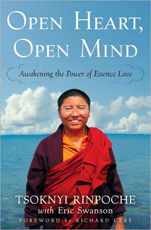"It's possible that the habit of exceeding one's internal speed limit can become a self-destructive loop if it continues for too long. On a very subtle level, it can be emotionally and intellectually inhibiting and unproductive. Most of us don't notice these loops until someone points them out to us.
"At that point, we're confronted with a choice: We can change our pattern, we can lower our speed limit, or we can carry on as usual.
"Some people choose to carry on. They enjoy the anger, tension, and disturbance they create. Some people recognize that the conflict they engender doesn't serve their personal or professional interests, and choose — perhaps reluctantly, perhaps slowly — to amend their approach.
"Such a choice can be life-altering. A young woman who was a leader of a charitable organization came to realize that her ambition to become the head of the organization conflicted with the goals of the organization.
" 'I wanted to be important,' she said. 'I wanted to be famous. But would that help the organization? No, I realized. After looking at what I wanted and what the people who were being helped by the organization needed, I realized that the people who were in need were more important than I was. I'd set myself on a speed track to take over the organization. I was exhausting myself every day trying to become the head of the group, and I was ignoring the goals of the group.'
"Exhaustion is one of the ways we recognize that we've exceeded our internal speed limit. We find ourselves unable to rest, to sleep, to even dream. Shutting ourselves off from casual interactions with others is another. We don't feel we have time for watercooler or coffee conversations. We make excuses for not meeting friends for lunch or dinner.
."As one student put it, 'My social life came to a standstill. I made nice apologies for refusing lunch or dinner invitations, telling people I was caught up in a project. But really, I was speeding.
" 'Why was I speeding? Because I was terrified. I was afraid that someone at work would speed ahead of me, and in this environment, losing a job is a scary thing. If I lost my job, I could lose my house. Maybe my kids could be taken away to foster homes. These worries kept me up at night, and I probably made decisions that were not in the best interests of the company I worked for. But I had my home to consider, my children, and how to keep food on the table.
" 'I started reaching out to other people. I accepted lunch and dinner invitations. And when I did, I discovered that I was not alone. A lot of people were scared. We talked, we ate and drank — cheaply. The best thing is that we banded together. We made a decision that our personal lives were as important as our professional lives. That 'getting ahead' didn't just mean getting a promotion — good luck in this job environment — but developing relationships with the people close to us. We made a promise to slow down, to spend more time with each other and with our partners, spouses, and family members.'
"I found it inspiring how this guy and his friends were able to recognize and acknowledge a common emotional pattern, help each other to work with it, and find a new openness and energy in their lives. I was reminded, too, of how easily thoughts and feelings can become compressed, causing us to behave in ways that are harmful to ourselves and others.
"In such cases, a little bit of clarity can go a long way."
